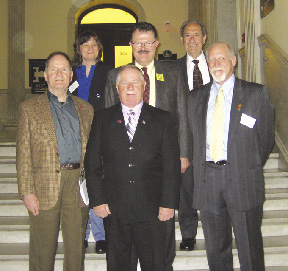Approximately 10 members of the Realtors Commercial Alliance of Massachusetts (RCA-MA) recently traveled to Boston to participate in the 24th annual "Realtors Day on Beacon Hill" activities conducted by the Mass. Association of Realtors (MAR).
The local Realtors met with their representatives and senators to encourage them to support House Bill H.2218, "The Community Leadership, Neighborhood-Revitalization and Urban-Violence Protection Act of 2009." Communities across the commonwealth are increasingly concerned about the number of vacant and abandoned foreclosed homes in their neighborhoods. Often these homes fall into disrepair, attract crime, and create safety issues. In addition, metal piping and other fixtures are often stolen from these homes, making their titles unmarketable for the mortgage loan qualification purposes. The problem is becoming widespread, hurting home values in neighborhoods in which thefts occur.
"Realtors feel the only way to revitalize those neighborhoods with a high concentration of foreclosures is to maintain and protect those homes so they can be sold. And supporting 'The Community Leadership, Neighborhood-Revitalization and Urban-Violence Protection Act of 2009' is one way to do it," said RCA-MA president Sandy Brown. "By creating a registry of vacant and foreclosed homes and requiring those who are responsible for those homes to maintain them along with making it difficult for scrap-metal thieves to operate, will go a long way to helping to solve the problem."
In addition to the calling for a statewide registry of abandoned and foreclosed property and copper pipe theft prevention, the opposition to bills proposing property transfer taxes was again a top priority. Members of the RCA-MA urged lawmakers to oppose bills (S.1316 and S.D.632) that would authorize the creation of a new transfer tax on the sale of property in the communities of Martha's Vineyard and Nantucket.
The imposition of this type of new sales tax on homes could have serious implications for the Mass. economy and set the wrong precedent for the commonwealth's tax policies. This form of taxation singles out home buyers and sellers, contributes to rising home prices, and is not a stable source of revenue. Additionally, such a tax circumvents the voter approval process inherent in a Proposition 2 ½ override.
Realtors also spoke with their legislators about supporting the following topics:
*Real Estate Licensing [Pre-Licensure]: S.121 "An Act Clarifying the Requirements for Licensing as a Real Estate Broker or Salesperson." This bill would enhance professionalism in the real estate industry through a modest increase in the pre-licensure requirements. This legislation would increase the education requirements for obtaining a real estate salesperson's license and it would also amend the educational and experience requirements for obtaining a real estate broker's license.
*Real Estate [Continuing Ed.]: H.3651 "An Act Clarifying Continuing Education Requirements for Real Estate Brokers and Salespersons." This bill would increase the number of continuing education credits real estate brokers and salespersons must receive to renew their license. It would also bring the commonwealth's continuing education requirements to a level that is on par with the majority of the states in the country.
*SCOPE: H.3474, S.768 "An Act Relative to the Disposal of Municipally Owned Vacant Property or "SCOPE," Selling City Owned Property Efficiently." This bill would give municipalities the option of selling municipally owned vacant and underutilized properties on the open market and get them into the hands buyers through a simplified and cost effective process. In many cases these vacant and abandoned units detract from the quality of neighborhood life and, instead of generating property tax revenues, these properties create a drain on community resources and services.









